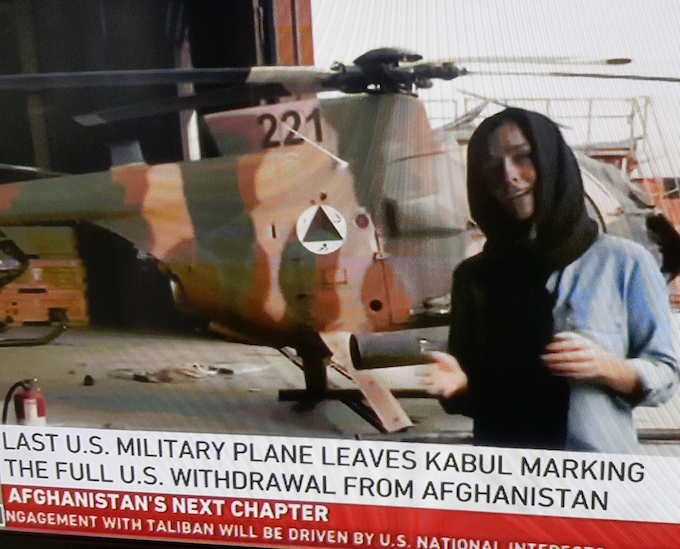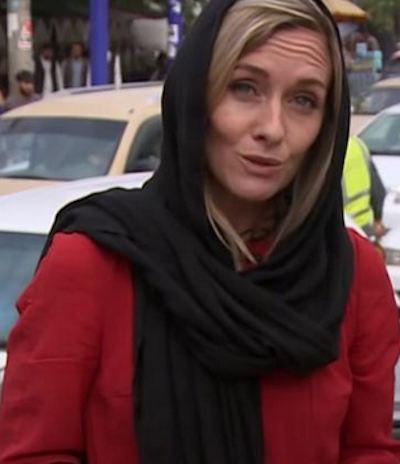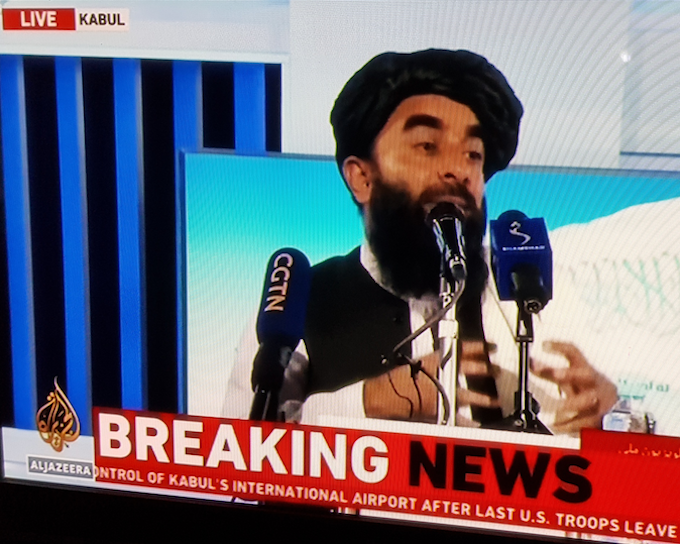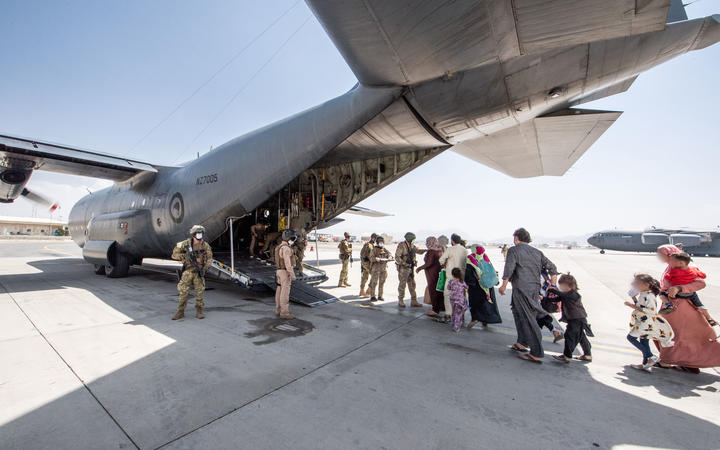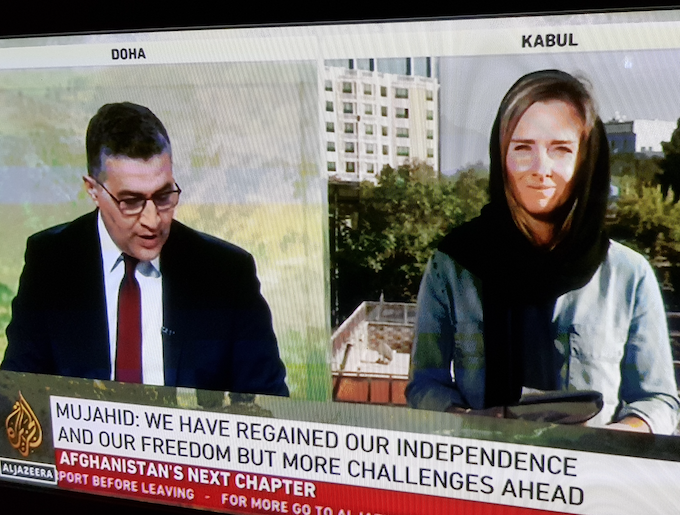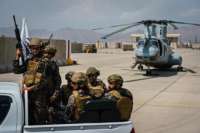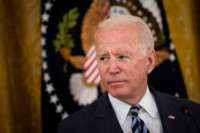All flags are on half-mast in the US of A. The cause is the 13 American soldiers killed in this huge suicide bombing outside Hamid Karzai International Airport in Kabul on Thursday, 26 August.
As it stands, at least 150 people – Afghans, including at least 30 Taliban, plus 13 American military – were killed and at least 1,300 injured, according to the Afghan Health Ministry.
The Islamic State (ISIS) claimed responsibility for the bombing via Amaq Media, the official Islamic State (ISIS) news agency. The perpetrators, the message says, were members of the ISIS-Khorasan, or ISIS-K.
As reported by RT, US military leaders knew “hours in advance” that a “mass casualty event” was planned at Kabul airport. However, accounts from the troops in harm’s way suggest that nothing was done to protect them or the airport. See here.
RT further reports: “The bombing provoked the US into launching two drone strikes, one targeting an alleged “planner” and “facilitator” with the group responsible, and another supposedly wiping out “multiple” would-be suicide bombers but reportedly annihilating a family and children alongside them.
Why was nothing done to prevent this bloody, atrocious attack? In fact, the Pentagon announced just yesterday that another massive attack was likely, meaning they have information that another mass-killing may take place?
In the meantime, the US Central Command (CENTCOM) confirmed that the last three US military transport planes have departed the Hamid Karzai Airport just ahead of the August 31, 2021, deadline, officially ending the American withdrawal from Afghanistan.
“The war is over. America’s last troops have just left Kabul airport,” RT’s Murad Gazdiev tweeted from Kabul, adding that the war lasted “19 years, 10 months and 25 days.”
What he didn’t say is that the monetary cost of the war was at least 3 trillion dollars, that about 241,000 people have been killed in the Afghanistan and Pakistan war zone since 2001. More than 71,000 of those killed have been civilians. These figures include (through April 2021) 2,448 American service members; 3,846 U.S. contractors, and some 66,000 Afghan national military and police.
Twenty years of war – and only ten days to defeat the US military.
Really? Is this really the end of the US involvement in Afghanistan? Too many strange events and occurrences are pointing in a different direction.
Let’s have a closer look. The Islamic State — ISIS — claims responsibility. As we know by now and since quite a while, ISIS is a creation of the CIA. The sophistication of the attack, the Pentagon non-interference, despite their prior knowledge, might, just might indicate that this attack may have been a well-coordinated “false flag”?
Who benefits? Cui Bono?
On August 19, 2021, the Washington Post, referring to President Trump’s Peace Agreement with Taliban in Doha, Qatar, in February 2020, reports:
As President Donald Trump’s administration signed a peace deal with the Taliban in February 2020, he optimistically proclaimed that “we think we’ll be successful in the end.” His secretary of state, Mike Pompeo, asserted that the administration was “seizing the best opportunity for peace in a generation.
Eighteen months later, President Joe Biden is pointing to the agreement signed in Doha, Qatar, as he tries to deflect blame for the Taliban overrunning Afghanistan in a blitz. He says it bound him to withdraw U.S. troops, setting the stage for the chaos engulfing the country.
But Biden can go only so far in claiming the agreement boxed him in. It had an escape clause: The U.S. could have withdrawn from the accord if Afghan peace talks failed. They did, but Biden chose to stay in it, although he delayed the complete pullout from May to September.
So, again who benefits from such an atrociously deadly attack like the one of 26 August at Kabul Airport?
President Biden, though unjustified, can and does blame President Trump for the chaos he left behind by negotiating this “irresponsible” Peace Deal. Why “irresponsible”? Wasn’t it time after 20 years without apparent “success” – whatever that means, or may have meant at some point in time – to end this senseless bloodshed and destruction of a sovereign Afghan society let alone the killing of hundreds of thousands of people, most of them civilians?
It seems that Mr. Trump may have done the right thing. Peace over war should always win, on the ground as well as in the minds of people, and foremost of politicians. However, there are several reasons, why Peace is not welcome. And chaos and destruction and death as demonstrated by the 26 August suicide attack, and who knows, maybe more to follow, might justify sending back US troops?
There are several other irons in the fire about which hardly anybody talks and the bought anti-Trump and pro-Biden mainstream media are silent.
The Heroin Trade
There is a multi-multi-billion, perhaps up to a trillion-dollar heroin trade at stake, for the US and for the US and European pharma-industry – the huge and deadly opioid-market.
As reported by Michel Chossudovsky on 21 August 2021:
One of the key strategic objectives of the 2001 war on Afghanistan was to restore the opium trade following the Taliban government’s successful 2000-2001 drug eradication program which led to a 94% collapse in opium production. This program was supported by the United Nations. (For details, see below)
In the course of the last 19 years following the US-NATO October 2001 invasion, there has been a surge in Afghan opium production. In turn the number of heroin addicts in the US has increased dramatically. Is there a relationship?
There were 189,000 heroin users in the US in 2001, before the US-NATO invasion of Afghanistan.
By 2016 that number went up to 4,500,000 (2.5 million heroin addicts and 2 million casual users).
In 2020, at the height of the covid crisis, deaths from opioids and drug addiction increased threefold.
It’s Big Money for Big Pharma.”
See the full report here.
The Chinese Belt and Road Initiative
Both China and Russia have already indicated that they would help the new Taliban regime to gain stability and to develop towards a newly independent, sovereign state. Afghanistan’s border with China, only about 70 km wide, but it forms a crucial connection to China’s western most Province, the Xinjiang Uygur Autonomous Region. It is a vital pivot for China’s Belt and Road, or “One Belt One Road” – OBOR – also called the New Silk Road.
While transit routes already go through Pakistan to the Indian Ocean, an OBOR rail and road transit through Afghanistan would connect China directly with Iran, facilitating among other trade, hydrocarbon transport from Iran to China. OBOR would also be an effective development instrument for war destroyed Afghanistan. A reconstruction and economic development scheme for Afghanistan could bring Afghanistan back to a respected nation state — even through the Taliban.
Furthermore, Afghanistan might be prepared for becoming an active member of the Shanghai Cooperation Organization (SCO), one of the world’s most significant political, economic and strategic defense organizations. In addition to China and Russia and the Central Asian former Soviet Republics, India and Pakistan are already full members, while Iran, Malaysia and Mongolia are, so far, in observer and associate status.
SCO covers almost half of the world population and controls some 30% of the world’s GDP. Afghanistan would be in a solid and guiding association as a SCO member. Afghanistan’s socioeconomic development and improvement of war-damaged people’s standard of living, could benefit enormously.
Washington, however, dislikes OBOR with a passion. They see it as Chinese expansionism and competition. It is actually neither. China has in her thousands of years of history never had expansionist trends, or ambitions, and always respected other countries’ sovereignty. OBOR, an ingenious idea of President Xi Jinping, is patterned according to the ancient Silk Road, a trading route of 2100 years ago connecting Asia with Europe and the Middle East.
OBOR is an instrument to help develop and connect the world, while respecting each nation state’s independence and sovereignty.
The hugely profitable Heroin Trade and the further development of China’s OBOR – and particularly bringing Afghanistan under the wings of the east through association with the SCO – would spoil America’s multi-multibillion heroin trade, as well as another Middle East country would orient itself to the east – and away from the fangs of the ever weakening and crumbling Anglo-US empire.
Hence, commanding US-created ISIS to sow chaos and death in Afghanistan, blaming the Taliban, might be a good reason for Biden to bring back US troops – to fight a new kind of war – fighting for the continuing highly profitable heroin trade and, simultaneously, fighting against OBOR. On top of it all, it would suit Biden and his globalist agenda image and standing in a totally misinformed world.
The post
Afghanistan: Drug Trade and Belt and Road first appeared on
Dissident Voice.
This post was originally published on Dissident Voice.
